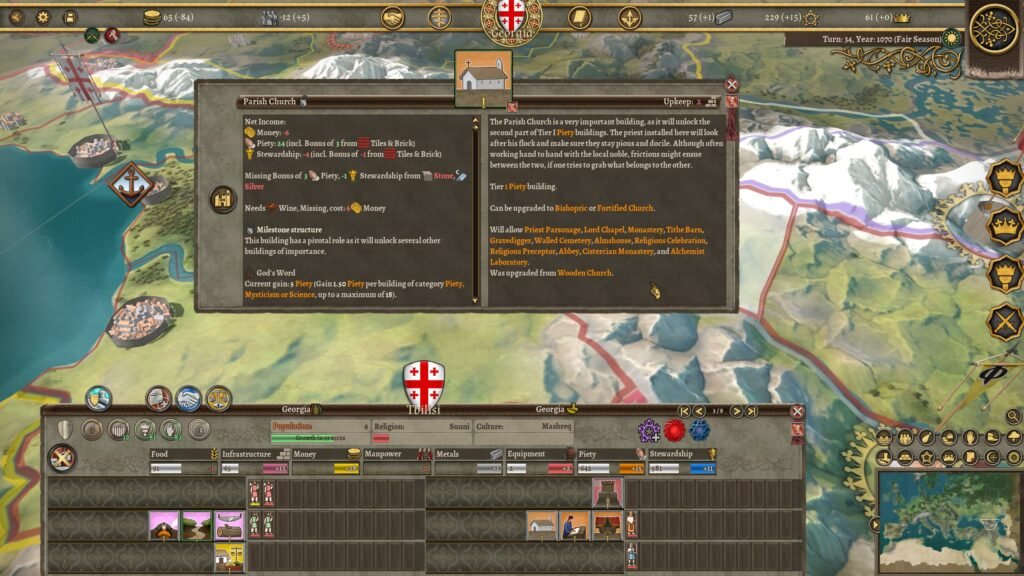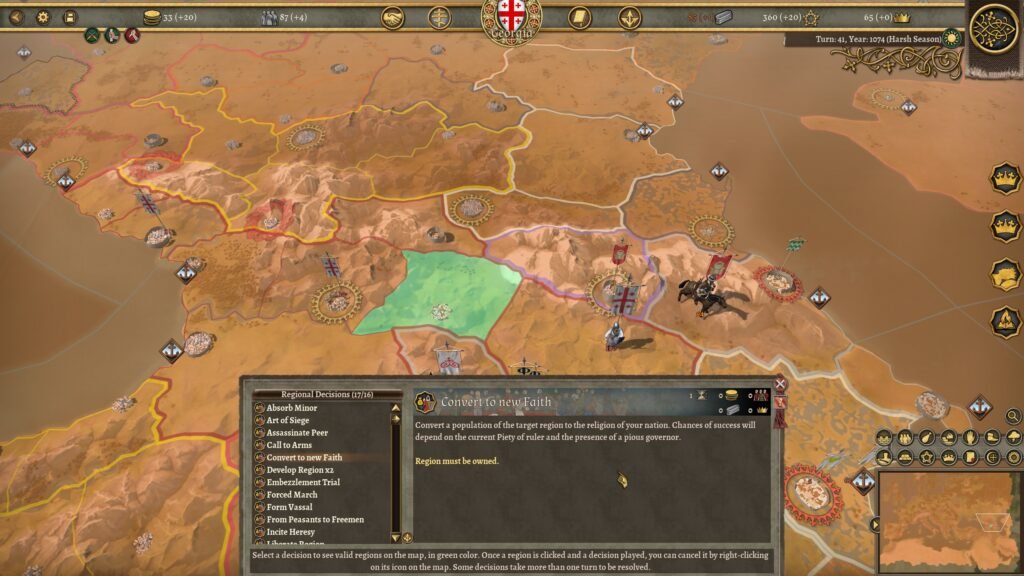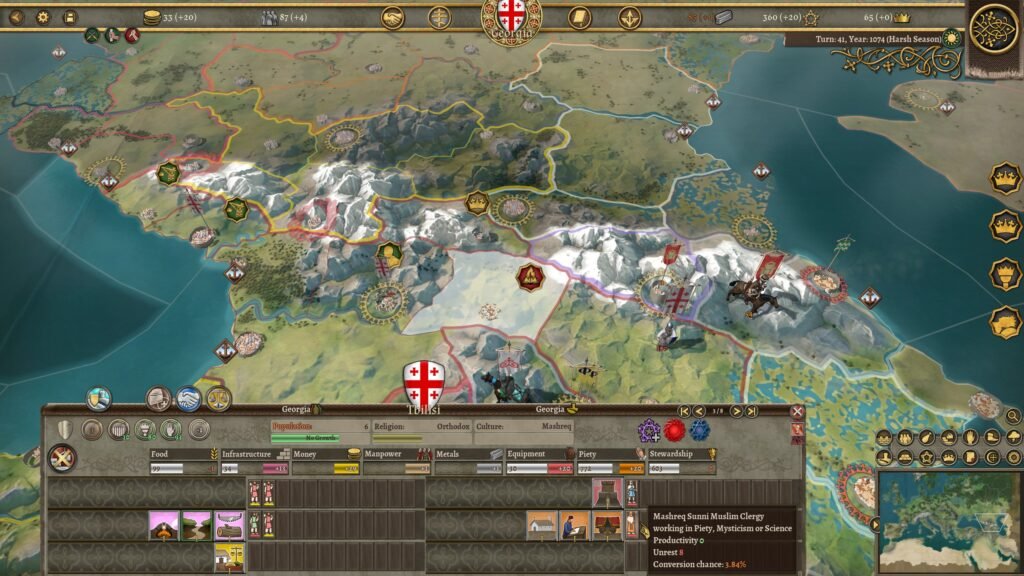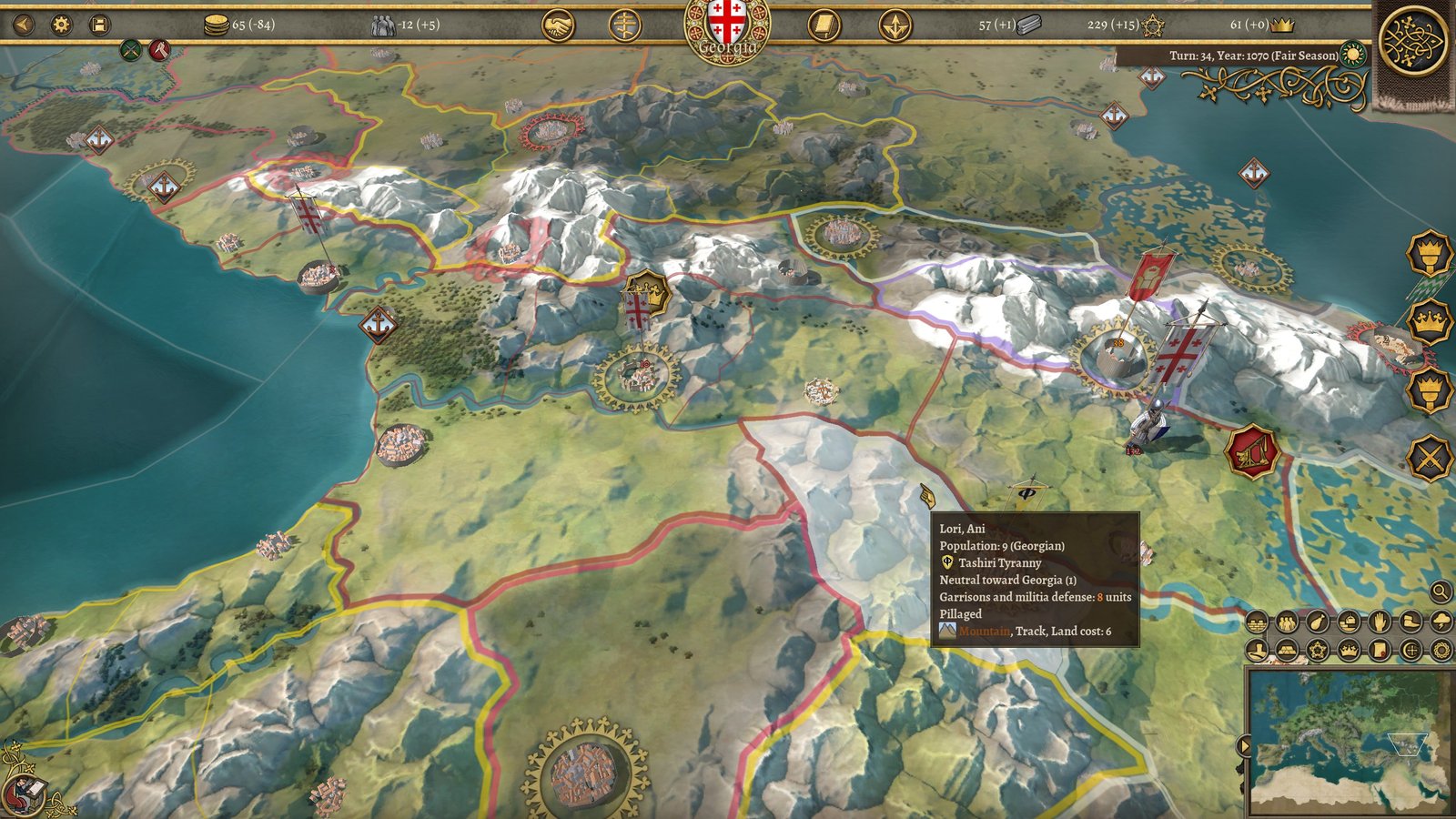By James Baillie
For this look at Field of Glory: Kingdoms, I’m going to take a brief look at how the game handles religion. For my examples, I’m going to zoom in on the Caucasus: its cross-cultural nature makes it both a great case study and a fun base for a campaign.
In strategy games, religion is often largely tied to unrest and popular opinion and is better for the player the more homogeneous they can make it. This is a structural/materialist ‘opiate of the masses’ view of religion, where religion is part of a system of control, a distracting and illusory alleviation of people’s suffering that makes them more satisfied with their conditions. Implementing this in games gives an effective tie-in between the player’s goals as ruler or abstracted leader of a political unit, and the need to represent something we know was vital to people’s lives in the past.
Field of Glory is a classic example of these sorts of mechanics. Piety, generated by clerical population units, gives a bonus to regional loyalty, and reduces the chance of “heretical” and “occult” events which can have negative effects. It also adds to wider legacy gain: more piety generation essentially scores more victory points.

Let’s unpack what this does and doesn’t say about religion. It suggests that imposing religious unity was important both for population control (loyalty) and in and of itself (legacy gain). With ties into the building system it explains conspicuous religious displays, like church-building. A real, honestly believed religion is, however, more than a tool of statecraft. Religious actions were not always taken strategically and clerics were themselves power-brokers: like religion did not always mean like minds. The game also enforces very clear dividing lines between ‘correct’ religion and heresy as a major threat: real faith was often more heterodox.
There’s also a modern viewpoint in this: being able to manipulate religion effectively was beyond the capacity of most medieval political units. Converting people en masse requires reach, manpower, and education – and, for rulers who relied on local nobility to govern, near total aristocratic buy-in. In fact, in the medieval Caucasus, there were different strategies on display to those a Field of Glory player is presented with. Medieval Georgian rulers in the C12th, despite their own Orthodox Christianity, patronised Armenian Apostolic churches and even Tbilisi’s mosques. Medieval faith didn’t always preclude actively courting support across religious lines, or even holding together multi-faith political alignments.

Field of Glory has some systems that could explore this more. Its population system does represent mixed religious populations like Tbilisi’s Muslims, and regional decisions are good ways to model specific acts of patronage. The opiate of the masses route is a tried and tested strategy game mechanic and is implemented well here, but building on the strategies real medieval rulers used in places like the Caucasus could also open up new strategic avenues in Field of Glory and similar games – challenging players with the messy realities and balancing acts of medieval religious and cultural exchange.


Thanks for this James – it ties in very nicely with Juan’s piece! You raise some really good points about the complexity and diversity of medieval religion. Do you have any thoughts as to what a more nuanced model would look like? And how could this be done in practice without making for an overly complex set of mechanics?
I think in FoG, part of it for me would be giving the player options through the decisions system to appeal to rather than suppress or convert faiths: using the regional decisions would be relatively low complexity because it doesn’t add a visible mechanic, just an option. I think the game’s vassalage type options are also something that could be played with quite effectively here: adding a decision that allows you to explicitly court a smaller non-co-religionist as a potential vassal or ally could be quite nice.
I think it could also be good to better show the trade-offs in “heresy”, which often is as much the creation of powers that want to hammer their dividing lines down as it is that of the heretics themselves – showing players that for example a more tolerant system could actually in a sense lead to *less* heresy as fewer people are “out of bounds” might create an interesting trade-off – do you go for a maximal religious fervour with heavy dividing lines, or do you take a broader approach and try to reduce unrest?
… And can a middle/balanced approach give any benefits? Thanks, I’m going to have to go and think about religion mechanics some more.
I guess a between-the-two in some ways, and it could depend a lot who and where you ruled. I think part of the tricky side is that there actually wasn’t a lot of strategic penalty to certain manifestations of religious coexistence (or, just as often, tolerance-as-control-mechanism): where it manifested, the vengeful end of religious fervour was something people in a lot of cases *actually believed* in ways that games find hard to model strategically. But I think also at least for the Caucasus a lot of religious penalties in most games are just too big – as a royal marrying outside your faith was something that might disgruntle people and should take serious thought, but a lot of games just effectively take it off the table entirely which doesn’t fit with what we know of the period. I think it’s possible to make religion matter without making the barriers so large that it becomes a team sport lineup.
Thank you so much for your paper and reflections, James! As you correctly point out, the game still has some utilitarian approaches to medieval religion that are common to strategy games, even if it tries to be quite nuanced. I am not familiar with the medieval Caucasus, but I was wondering if you could expand a little on how religion and politics intertwined in this region and how we could relate this to some of the other mechanics that impact religion in FoG, such as the ruler’s authority or the nobility’s loyalty?
I think the approach to religious difference was often quite pragmatic – rulers absolutely presented themselves in religious terms, but in ways that clearly blurred boundaries at times e.g. Christian rulers minting coins in the same style as their Muslim neighbours right down to “defender of the faith” type titles in Arabic, which faith being quietly put aside for numismatic purposes. Muslim-Christian marriages at the royal level absolutely happened and were taken as serious propsitions. That’s not to say people didn’t take their religion very seriously, but mass conversion wasn’t really on the table, and it was often important to hold the loyalty of non-co-religionist nobility – I think this could actually be quite easy to mechanise in some ways, for example by making it easier to rule areas of a different religious persuasion if you have vassals who are of that faith/culture.